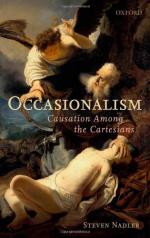|
This section contains 846 words (approx. 3 pages at 300 words per page) |

|
OCCASIONALISM. [This entry deals specifically with Islamic occasionalism.]
The adjective occasional, as applied to causes or events, is used by medieval European theologians such as Thomas Aquinas to mean an "indirect cause which determines any disposition to any effect" (Summa theologiae 1.114.3, 2.1.88.3, 2.1.98.1–2, 2.1.113.7, et passim). In modern philosophy, the term occasional and its derivatives are used by Cartesians such as Malebranche (d. 1715), Guelincks (d. 1669), and Cordemoy (d. 1685) to refer to the relations between the modifications of mind and those of body, as well as to natural occurrences in general. Malebranche in particular denies any necessary connection between those two classes of modifications and refers all natural occurrences, human actions, and other events to God's direct intervention, of which the manifest or natural causes are nothing but the "occasions" (Entretien sur la métaphysique 7.11, 7.13).
In the history of Islamic theology (kalām), an "occasionalist" tendency is clearly discernible from the eighth...
|
This section contains 846 words (approx. 3 pages at 300 words per page) |

|


